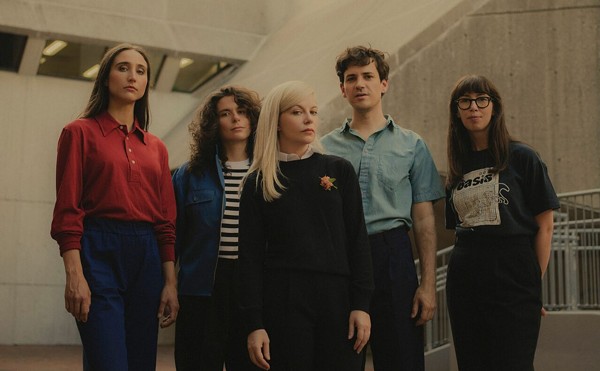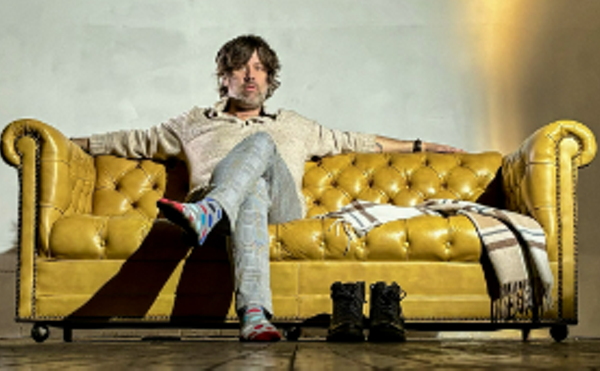Since Gogol Bordello is unlike almost any other band in the world, it would only follow that its pathologically unique frontman, Eugene Hütz, would conduct an interview unlike any other frontman in the world. The Gogols are currently touring in Russia and cell-phone reception could charitably be called spotty, so Hütz answers questions via e-mail from the back of the tour van as the band glides past the nuclear submarines docked at St. Petersburg.
The Gogols’ current tour schedule is every bit as frenetic as their incendiary stage show (they once had the plug pulled on a show at a New York Greek restaurant because the crowd was actually bowing the wooden floor). After Russia, they head to Japan, then back to the U.S. for 10 days and then it’s back to Europe until September, when they’re Stateside again. Then it’s the fall Canadian circuit and back to Europe through the end of the year. Such is life for a band that truly offers worldwide appeal, a quality they come by honestly.
Hütz fled to the Ukraine as a teenager, in the wake of the Chernobyl disaster, and it was along that path that he discovered his family came from gypsy stock, a revelation that would shape his growth as a traveling musician/artist/actor. After a succession of refugee camps, his family ultimately immigrated to Vermont, but Hütz made his way to New York City very quickly and began forging a musical identity based on the punk sounds he loved as a teenager and the ethnic music that had surrounded him all his life. He would eventually christen this sound “gypsy-punk cabaret.”
Hütz’s first band attempts were geared more to the punk side of the equation, until he took a gig at a Russian wedding in Vermont and was directed to play gypsy music, a galvanizing moment that inspired him to conceive a hybrid of the two genres and a few others for spice. By 1998, Hütz had succeeded in assembling the right mix of Middle Eastern/Eastern European refugees in an aggregation known, at least for a while, as Eugene Hütz and the Béla Bartóks.
“I was a leader previously to three other bands — Uksusnik, Flying Fuck, the Fags...that’s my résumé,” says Hütz via laptop. “[The Béla Bartóks] was just a transitional name that wasn’t nearly as great. There were many others too.”
With the revelation that everyone in the band at the time was a fan of melancholic Russian writer Nikolai Gogol, Hütz combined the writer’s surname with the archaic term for a whorehouse and Gogol Bordello was born. The newly dubbed outfit began honing its wildly unpredictable stage presence as well, led by the entertaining and unhinged Hütz, whose stage persona combines the comedic timing of Sacha Baron Cohen, the visceral punk intensity of Iggy Pop and the gut-wrenching showmanship of Jim Rose.
For their first two albums, 1999’s Voi-La Intruder and 2002’s Multi Kontra Culti vs Irony, the band (which almost entirely turned over its membership between albums, save for Hütz and drummer Eliot Ferguson) worked with veteran noisemonger Steve Albini, who matched their madness step for step, and together they created memorable studio documents that hinted at the Gogols’ raging live show.
It was the Gogols’ 2005 debut for SideOneDummy Records, Gypsy Punks: Underdog World Strike, that finally tapped into the sound that Hütz was hearing in his head and more effectively translated the band’s live sound to the studio. Still, each album has had its role to play in the development of the Gogol Bordello ethic.
“The goals are always the same: to make the best record possible,” says Hütz. “And I worked on them all, as hard as I could possibly do with everything I had at the moment. But, of course, they all have different central themes and are influenced by living in different places, and that is how we would like to keep it — evolution, baby.”
The Gogols’ fourth album, last summer’s Super Taranta, stands as the pinnacle of the band’s recorded testaments to date. Veering madly between traditional gypsy jazz populated with hyper-caffeinated guitar riffs to a similar foundation filtered through the visceral shred of speed metal, Super Taranta pushed the envelope in ways that were surprising even to Gogol Bordello.
“Super Taranta was more advanced than any other record, compositionally and especially musicianship-wise,” says Hütz. “So we are very proud of that record for being able to show a more panoramic Gogol Bordello.”
Not surprisingly, Super Taranta became Gogol’s greatest critical triumph, garnering almost universally glowing press for its wild variations within the gypsy-punk jazz framework that Hütz has been tweaking for more than a decade.
“I guess songwriting has been one of the most talked about things about this album, which to me is funny — that it’s happening only now,” says Hütz. “For me personally, songwriting is the thing that holds everything together. That’s my main creative discipline. I guess the general unorthodoxy of my themes and song structures were mistaken previously for unsuccessful attempts to finally write A-B-C-structured songs, but that I did when I was 12 years old. I just edit more coherently in a certain way now, and boom, there goes the recognition.”
Part of that recognition comes simply from the breadth of exposure that Gogol Bordello has experienced in the past three years. Gypsy Punks got the ball rolling, followed by Hütz’s turn as an actor — more than holding his own with top-billed Elijah Wood in the brilliant indie film Everything Is Illuminated (the soundtrack of which included a pair of contributions from the band) — and Gogol’s crowd-pumping appearances on that year’s Warped tour. They’ve played the last two Bonaroos to rapturous receptions, and this week marks their much-anticipated Lollapalooza debut. With the success of Super Taranta, Hütz recognizes that the horizon is wide open for the Gogols at this point.
“We are only scratching the surface, and that’s the feeling that will always be there, no matter how much is under the belt,” says Hütz. “Imagination always takes you higher and visions keep accruing, but it is nice to be part of a transcontinental family of artists that matter.”
With so much going on, seemingly around the world almost simultaneously, it’s understandable that Hütz and his band of adrenalized gypsies don’t actually take the time to plot a course on this punk pirate’s shakedown cruise. When the question of short- and long-term goals for Gogol Bordello arises, Hütz succinctly quotes the title of Gypsy Punks’ Slavic swing track.
“Think locally, fuck globally.”
Now there’s a mission statement for your ass.












